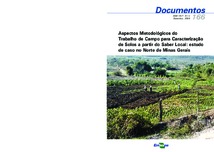Aspectos metodológicos do trabalho de campo para caracterização de solos a partir do saber local: estudo de caso no norte de Minas Gerais.
Aspectos metodológicos do trabalho de campo para caracterização de solos a partir do saber local: estudo de caso no norte de Minas Gerais.
Author(s): CORREIA, J. R.; ANJOS, L. H. C. dos; NEVES, D. P.; LIMA, A. C. S.; TOLEDO, L. de O.; CALDERANO FILHO, B.
Summary: ABSTRACT: Despite of all modem communications tools, difficulties of dialogue still exist between technicians and local community members when dealing with natural resources. This is related to many factors, from the predominantly technical formation of the teachers and researches to the difficult of local population members to be understood about their relationship with the surrounding environment. In the case of Soil Science, this problem also occurs. Proposals for planning soil sustainable usage, usually, are compromised because the do not consider the local knowledge, especially in rural communities, where there is no basic material compatible to the work scale needed. The approach of observing the environment and how humans interact with it, from the point of view of the local actors, may contribute to a better comprehension of the human-environment relationship. The organization of information about soils with the perspective of the farmers may turn possible knowing their potentialities and limitations for usage. The objective of this bulletin is to present a methodological tool for field work with elements to construct soil surveys adequate to the scale of local community needs, considering the local knowledge, usage of land and customs. It will be presented a protocol of actions that consider the local environment, from biophysics, social and cultural, and economical points of view, to represent the landscape in such a way to reflect all this features. This procedure is fundamental when soils and environment are viewed in the perspective of the local populations, which depend of their usage and management for survival. To exemplify this proposal of methodology, it is presented a case study with farmers in Comunidade Água Boa 2, municipality of Rio Pardo de Minas, located in the north region of Minas Gerais State, Cerrado Bioma, Brazil. The narrative of many events which occurred during the study will allow understanding the dimension of researcher's involvement necessary to collect information, in order to best represent the point of view of the local community members.
Publication year: 2006
Types of publication: Books
Unit: Embrapa Cerrados
Observation
Some of Embrapa's publications are published as ePub files. To read them, use or download one of the following free software options to your computer or mobile device. Android: Google Play Books; IOS: iBooks; Windows and Linux: Calibre.
Access other publications
Access the Agricultural Research Database (BDPA) to consult Embrapa's full library collection and records.
Visit Embrapa Bookstore to purchase books and other publications sold by Embrapa.

